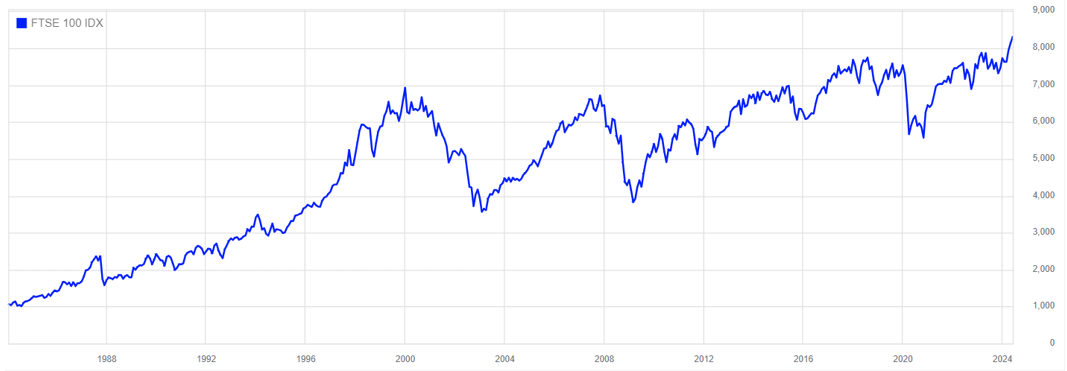In his spring Budget on 6 March 2024, chancellor Jeremy Hunt announced that the government would consult on the possibility of creating a new “British ISA”.
This new type of ISA would give investors an additional £5,000 allowance on top of their normal ISA allowance of £20,000 in the 2024/25 tax year. However, you’d only be allowed to invest this £5,000 in UK markets.
The reception to the British ISA was mixed, with many welcoming the additional allowance, but also raising concerns about “home bias”. Some people also questioned whether investors would want to increase their exposure to UK markets, which they saw as underperforming.
Indeed, according to CityWire, economic commentator Sam Bowman said: “If the government had done this 10 years ago, British savers would be much poorer today. A lot of people probably wouldn’t have bothered saving at all, if the only tax-free option was a real-terms loss in the anaemic FTSE 100.”
Yet, his pessimism about UK markets may be unfounded as the FTSE 100 – an index of the 100 most highly capitalised companies listed on the London Stock Exchange (LSE) – has hit a record high several times recently.
On 17 May 2024, MoneyWeek reported that the FTSE 100 has grown by around 10% so far in 2024 and although it has fallen below its recent peak, it continues to perform well.
As a result, you might wonder why the UK markets are thriving right now and how this could affect your investments.
Read on to learn what’s behind the FTSE 100’s record performance and whether it could affect your financial plan.
Inflation has fallen to 2.3% and the UK economy is no longer in recession
In the past few years, poor economic performance and political uncertainty hampered the growth of the FTSE 100. Indeed, according to the Guardian, the index only grew by 3.8% in 2023. Yet, it’s already increased in value by more than double this in 2024.
This may be partly because the economic situation in the UK looks brighter now than it did in 2023. For example, inflation has been falling and the Office for National Statistics (ONS) reports that it was 2.3% in the 12 months to April 2024 – the lowest level since July 2021.
Additionally, the economy is growing again after a short-lived recession at the end of 2023 and economists are more hopeful that wages can rise without causing inflation to increase again.
Now that inflation is falling, the Bank of England (BoE) is also expected to reduce interest rates soon. If this happens, borrowing may be cheaper, and the average consumer might have more disposable income as a result. This could mean a valuable influx of cash to businesses as people spend more.
Falling interest rates may also reduce the cost of borrowing for businesses. Consequently, business owners may be able to increase investment in their companies and potentially expand.
Ultimately, a combination of increased consumer spending and more investment in businesses might mean that share prices continue to perform well in the future.
As a result, investors may be more inclined to put their wealth into UK markets now to benefit from this. Consequently, as demand increases, stock values may also rise, and this could influence the positive performance of the FTSE 100.
Several high-performing companies are driving the value of the FTSE 100
The general improvement in the UK economy has influenced the overall performance of the FTSE 100. However, a handful of high-performing companies in specific industries are also driving significant growth.
For instance, instability in the Middle East and the war in Ukraine have led the UK government to commit more funds to defence spending. As a result, companies in the aerospace and defence industries have seen significant growth.
According to interactive investor, the market capitalisation of BAE Systems – the largest defence contractor in Europe – has increased by around a quarter since the beginning of 2024. Additionally, the stock price of Rolls-Royce, which manufactures engines for military vehicles, has risen by approximately 40% this year.
Certain financial stocks including Barclays and NatWest have also seen notable growth, and the mining sector is performing well because copper assets are an important part of green energy and Artificial Intelligence (AI) products.
These companies make up a large percentage of the total UK market. As such, their success has contributed to the record highs that the FTSE 100 is currently experiencing.
Multinational companies may have benefited from a weak pound
Many of the companies listed on the FTSE 100 are multinationals, generating much of their income abroad. Indeed, according to Investment Week, around 75% of the revenue generated by companies on the FTSE 100 comes from overseas.
This could shield the FTSE 100 from large losses when the economy is weak because, although UK-focused businesses may lose revenue, those trading internationally might continue to thrive in stronger economies elsewhere.
Additionally, when the UK is experiencing an economic downturn and the pound is weak, this could benefit multinational companies. This is because cheaper British goods are attractive to overseas consumers and the revenue businesses generate overseas will be worth more when they convert it back into sterling.
Consequently, many companies listed on the FTSE 100 may have seen positive growth despite a slow economy at home.
The FTSE 100 has experienced record highs many times over the years
As an investor, you might be wondering how the current performance of the FTSE 100 could affect your financial plan.
Perhaps you’re worried that the FTSE 100 reaching an all-time high means that a market correction is due?
Fortunately, all-time highs are relatively common because the markets tend to continue growing over the long term, despite short-term fluctuations. Indeed, according to Barclays, the US S&P 500 index has ended the month at a record high over a quarter of the time since 1950.
So, while past performance doesn’t guarantee future returns, the historical data suggests that the value of your investments could still grow in the future when the market reaches new highs.
This trend can be seen in the FTSE 100 too. The following graph shows the performance of the index between 1 January 1984 and 24 May 2024.

Source: London Stock Exchange (LSE)
As you can see, the FTSE 100 has reached record highs countless times over the years and has still followed a general upward trend.
Historical data also suggests that fears of a large market downturn after a record high may be unfounded.
According to Investors’ Chronicle, the chances of the S&P 500 falling by more than a tenth in the year after reaching a new record high were just 9%. This figure falls to 2% for a three-year period and 0% for a five-year period.
Even when there was a sharp fall following a record high, the markets recovered relatively quickly and continued growing.
As such, if you adopt a long-term approach to investing, your strategy may not be affected by the fact that the FTSE 100 has reached an all-time high. That’s why it may be more sensible to stick to your financial plan, regardless of whether the markets are experiencing a record high or not.
Most importantly, you may want to focus on your financial goals and adopt a long-term strategy that could help you achieve them.
Get in touch
We can help you select investments that align with your financial goals.
Email enquiries@blackswanfp.co.uk or contact your adviser on 020 3828 8100.
Please note
This article is for general information only and does not constitute advice. The information is aimed at retail clients only.
The value of your investments (and any income from them) can go down as well as up and you may not get back the full amount you invested. Past performance is not a reliable indicator of future performance.
Investments should be considered over the longer term and should fit in with your overall attitude to risk and financial circumstances.
The post What’s behind the FTSE’s record high? appeared first on Black Swan Financial Planning.
“Black Swan Financial Planning was established in 2000, and since then became one of the top independent financial adviser firms in the UK.”
Please visit the firm link to site




